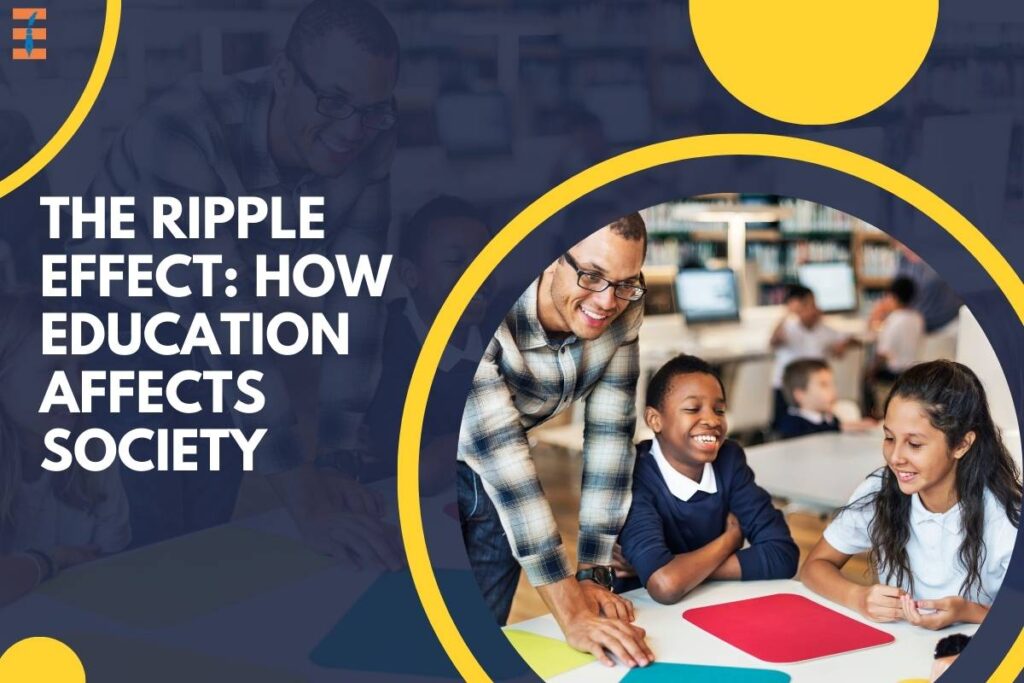Education stands as the cornerstone of societal development, wielding a profound influence that extends far beyond the classroom walls. Its impact resonates through generations, shaping cultural norms, economic landscapes, and political dynamics. From fostering critical thinking to promoting social cohesion, the role of education in society is multi-faceted and transformative. In this discourse, we delve into the intricate interplay between how education and societal evolution, unraveling the myriad ways in which education affects society.
Here are 8 myriad ways in which education affects society:
1. Empowering Minds
At its essence, education affects society by empowering individuals by equipping them with knowledge, skills, and perspectives necessary for personal and professional growth. It serves as a catalyst for intellectual curiosity, igniting a thirst for learning that transcends boundaries. By nurturing cognitive abilities and fostering a culture of inquiry, education cultivates innovators, problem solvers, and thought leaders who drive progress and innovation in diverse fields. From scientific breakthroughs to artistic masterpieces, the fruits of education enrich human civilization, propelling us towards greater heights of achievement.
2. Economic Prosperity

Education affects society by forming the bedrock of economic prosperity, serving as the engine of innovation and productivity. A skilled workforce honed through quality education, fuels economic growth by driving technological advancements, entrepreneurial endeavors, and industrial development. Moreover, education enhances labor market participation and facilitates upward mobility, enabling individuals to secure better-paying jobs and improve their living standards. In this regard, investments in education yield substantial returns, both in terms of individual livelihoods and national economies, fostering sustainable development and reducing socio-economic disparities.
3. Fostering Social Cohesion
Education affects society by playing a pivotal role in fostering social cohesion and building inclusive communities. By promoting values of tolerance, empathy, and mutual respect, education cultivates a culture of understanding and appreciation for diversity. Educational institutions serve as melting pots where individuals from varied backgrounds come together, transcending cultural barriers and forging meaningful connections. Furthermore, education instills civic virtues and democratic principles, empowering citizens to actively participate in the political process and advocate for social justice. In essence, education serves as a unifying force that binds society together, bridging divides and nurturing a sense of belonging among its members.
4. Combatting Ignorance and Prejudice
One of the most potent weapons against ignorance and prejudice is education. By dispelling misconceptions and challenging stereotypes, education affects society by fostering greater cross-cultural understanding and promoting social harmony. Through exposure to diverse perspectives and experiences, individuals gain insights into the complexities of the human condition, fostering empathy and compassion towards others. Moreover, education equips individuals with the critical thinking skills necessary to discern fact from fiction, enabling them to navigate an increasingly complex and interconnected world with confidence and discernment. In this way, education serves as a bulwark against the forces of intolerance and bigotry, laying the groundwork for a more just and equitable society.
5. Promoting Health and Well-being

Education is intricately linked to health outcomes and overall well-being, exerting a profound influence on lifestyle choices, healthcare access, and disease prevention. Education affects society by imparting knowledge about nutrition, hygiene, and preventive healthcare practices, education empowers individuals to make informed decisions that promote their physical and mental health. Furthermore, education plays a crucial role in breaking the cycle of poverty and improving access to healthcare services, thereby reducing disparities in health outcomes across socio-economic groups. Through health education initiatives and public awareness campaigns, education emerges as a powerful tool for promoting healthy behaviors and combating endemic diseases, contributing to the overall welfare of society.
6. Catalyzing Technological Advancement
In an era defined by rapid technological innovation, education emerges as a linchpin for navigating the complexities of the digital age. By fostering digital literacy and technological proficiency, education affects society by equipping individuals with the skills necessary to thrive in an increasingly digitized world. Moreover, education fuels scientific discovery and technological advancement by nurturing the next generation of innovators and problem solvers. From STEM education programs to interdisciplinary research initiatives, education serves as a crucible for innovation, driving progress in fields ranging from artificial intelligence to renewable energy. In this regard, investments in education are essential for ensuring continued technological advancement and global competitiveness in the 21st century.
7. Education as a Catalyst for Sustainable Development
In the face of pressing global challenges such as climate change, resource depletion, and environmental degradation, education emerges as a potent catalyst for sustainable development. By promoting environmental literacy and instilling a sense of stewardship for the planet, education empowers individuals to make ecologically responsible choices and advocate for conservation efforts. Furthermore, education fosters innovation in green technologies and sustainable practices, driving the transition towards a more sustainable and resilient society. Through interdisciplinary approaches that integrate environmental education into curricula across disciplines, education equips future generations with the knowledge and skills necessary to address the complex challenges of environmental sustainability.
8. How Education Affects Society in Conflict Resolution and Peacebuilding

Education plays a pivotal role in conflict resolution and peacebuilding efforts, offering a pathway towards reconciliation, tolerance, and social cohesion in divided societies. By promoting intercultural dialogue and understanding, education helps to break down barriers of mistrust and hostility, fostering empathy and cooperation among diverse communities. Moreover, education empowers individuals to critically examine the root causes of conflict and injustice, enabling them to become agents of positive change in their communities. Through peace education initiatives that teach conflict resolution skills and promote non-violent communication, education contributes to the cultivation of a culture of peace and reconciliation, laying the foundation for lasting stability and prosperity.
Challenges and Opportunities in Education Reform
Despite its transformative potential, education systems around the world face a myriad of challenges, including inadequate funding, unequal access, and outdated curricula. Addressing these challenges requires bold and innovative approaches to education reform that prioritize equity, quality, and relevance. Investments in teacher training and professional development are essential for ensuring that educators are equipped with the skills and resources necessary to deliver high-quality instruction. Moreover, efforts to expand access to education, particularly for marginalized and vulnerable populations, are crucial for promoting social inclusion and reducing disparities in educational outcomes.
At the same time, advances in technology offer unprecedented opportunities to revolutionize education delivery and expand access to learning opportunities. Online learning platforms, digital resources, and mobile technologies have the potential to reach learners in remote and underserved communities, providing them with access to high-quality educational content and resources. Furthermore, innovative pedagogical approaches such as project-based learning, experiential learning, and competency-based education can enhance student engagement and promote deeper learning outcomes.
Conclusion:
In conclusion, education stands as a cornerstone of societal progress and human development, shaping the trajectory of our collective future in profound ways. Education affects society, and from fostering economic prosperity and social cohesion to promoting environmental sustainability and peace, the transformative power of education is undeniable. As we confront the complex challenges of the 21st century, investing in education must remain a top priority for governments, policymakers, and stakeholders across sectors. By harnessing the potential of education to empower individuals, build resilient communities, and drive positive change, we can create a more just, equitable, and sustainable world for present and future generations.










